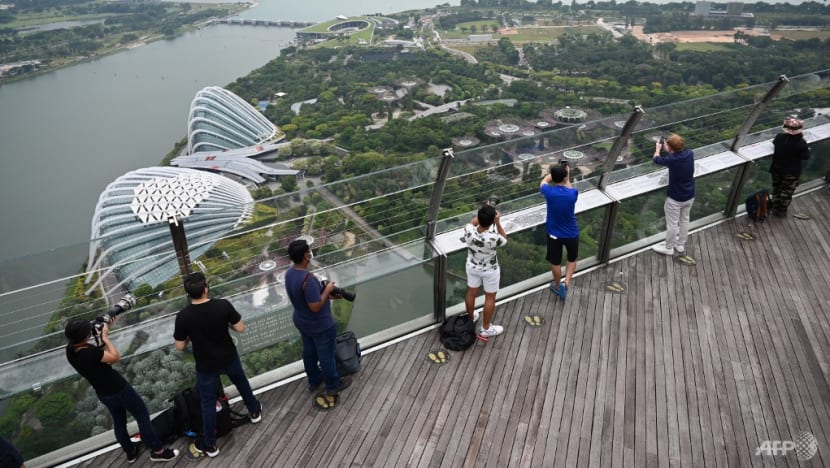US CDC says COVID-19 level in Singapore 'unknown' in updated travel notice

People enjoy the view on top of Marina Bay Sand's skypark observation deck in Singapore on Oct 18, 2021. (Photo: AFP/Roslan Rahman)
SINGAPORE: The US Centers for Disease Control and Prevention (CDC) has warned that the level of COVID-19 in Singapore is "unknown" in a travel health notice updated on Tuesday (Jan 4).
"Because the current situation in Singapore is unknown, even fully vaccinated travellers may be at risk for getting and spreading COVID-19 variants," the CDC said.
It advised people to avoid travel to Singapore. "If you must travel to Singapore, make sure you are fully vaccinated before travel," it added.
On Wednesday, Health Minister Ong Ye Kung said the reclassification was done because the CDC "is not aware of our surveillance test numbers", and that Singapore was providing it with the data.
The CDC uses COVID-19 data reported by the World Health Organization (WHO) and other official sources to make determinations about travel health notice levels, according to its website.
"If a destination does not provide data, their travel health notice level is designated as 'unknown' and travellers are advised to follow travel health notice Level 4 recommendations," said the CDC.
Other countries that the US CDC has classified as having an "unknown" level of COVID-19 include Afghanistan, Cambodia, North Korea and Syria.
Mr Ong said the Ministry of Health was engaging the US embassy in Singapore and the CDC to provide the necessary data.
"Just to be clear, we know our situation very well," Mr Ong said during a COVID-19 task force press conference on Wednesday.
"Every week, we administer over 150,000 PCR (polymerase chain reaction) tests. And that works out to over 21,000 PCR tests per day. Positive rates for these tests are under 2 per cent."
There are also 145 wastewater testing stations across Singapore in places like housing estates, dormitories and nursing homes, he said.
"Only a very small handful are registering the presence of COVID-19 viral-fragments. So we are sure that the incidence of COVID-19 in our community is currently low and stable."
Related:
In response to CNA's queries, a spokesperson from the CDC said that Singapore's change in classification was due to a lack of testing data that the CDC used to get from online data aggregator Our World in Data.
That information has not been updated since Nov 8, the CDC said.
The CDC evaluates primary criteria data including cumulative new case numbers and case trajectory information provided directly by health ministries to the WHO, its spokesperson said.
Secondary criteria data, such as tests conducted per capita and test-to-case ratio, is obtained from sources like Our World in Data and health ministry websites.
The data is measured over a 28-day period and reviewed daily, the CDC added.
When asked for an update on the matter on Friday, the CDC said that it was "working with the Singapore Ministry of Health regarding their COVID-19 testing data" and that it would update its travel health notice accordingly.
Singapore was previously in the highest risk category of the CDC's travel health notice system. It was placed in Level 4, which indicates "a very high level of COVID-19", on Oct 18 last year.
In the week leading up to the date of that reclassification, Singapore averaged about 3,071 new COVID-19 cases a day.
The country has averaged about 455 new cases a day in the week leading up to and including Jan 4.
BOOKMARK THIS: Our comprehensive coverage of the COVID-19 pandemic and its developments
Download our app or subscribe to our Telegram channel for the latest updates on the coronavirus pandemic: https://cna.asia/telegram















